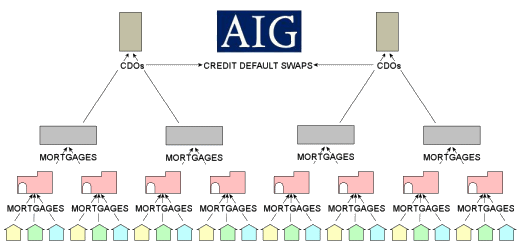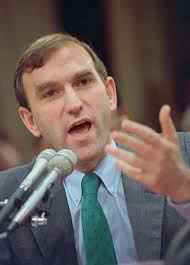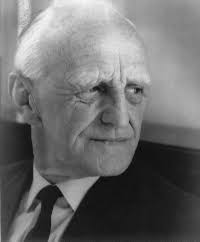Posted on Tuesday 24 March 2009
Joe Baca: When Was It Broken?
By emptywheelJoe Baca [D-CA] asked Ben Bernanke a very simple question in today’s House Financial Services hearing on AIG: When was AIG broken? When did it get so screwed up that we would have to bail it out.
Bernanke, however, didn’t give Baca a clear answer. He did say this:
The Office of Thrift Supervision is a small agency that specializes in addressing the problems of thrifts. It was, in this case, involved only because AIG owned a small thrift. It’s main concern is the protection of the thrift. It’s true, as [Polakoff] said, that he looked at some of these elements in the AIGFP division. But I do think that, given the size of the company and the risks being taken, a larger, more effective, stronger, better funded regulatory effort would have been needed in order to identify these problems.What Bernanke didn’t want to say was:
1999. When Congress dismantled the regulation on this kind of gambling.Matt Taibbi explained it in more depth. First, he talked about Glass-Steagall (passed in 1999), that made it possible for insurance companies to dress up as trading firms. Then, he explained that Gramm pushed through the Commodity Futures Modernization Act [in 2000)] which made it impossible to regulate CDS.
The blanket exemption meant that Joe Cassano could now sell as many CDS contracts as he wanted, building up as huge a position as he wanted, without anyone in government saying a word. "You have to remember, investment banks aren’t in the business of making huge directional bets," says the government source involved in the AIG bailout. When investment banks write CDS deals, they hedge them. But insurance companies don’t have to hedge. And that’s what AIG did. "They just bet massively long on the housing market," says the source. "Billions and billions."Then, another bit of 1999 deregulation made it easy for huge companies like AIG to select to be regulated by the undermanned Office of Thrift Supervision [the one that Bernanke talks about above].
In the biggest joke of all, Cassano’s wheeling and dealing was regulated by the Office of Thrift Supervision, an agency that would prove to be defiantly uninterested in keeping watch over his operations. How a behemoth like AIG came to be regulated by the little-known and relatively small OTS is yet another triumph of the deregulatory instinct. Under another law passed in 1999, certain kinds of holding companies could choose the OTS as their regulator, provided they owned one or more thrifts [better known as savings-and-loans]. Because the OTS was viewed as more compliant than the Fed or the Securities and Exchange Commission, companies rushed to reclassify themselves as thrifts. In 1999, AIG purchased a thrift in Delaware and managed to get approval for OTS regulation of its entire operation.Making matters even more hilarious, AIGFP — a London-based subsidiary of an American insurance company — ought to have been regulated by one of Europe’s more stringent regulators, like Britain’s Financial Services Authority. But the OTS managed to convince the Europeans that it had the muscle to regulate these giant companies. By 2007, the EU had conferred legitimacy to OTS supervision of three mammoth firms — GE, AIG and Ameriprise.
That same year, as the subprime crisis was exploding, the Government Accountability Office criticized the OTS, noting a "disparity between the size of the agency and the diverse firms it oversees." Among other things, the GAO report noted that the entire OTS had only one insurance specialist on staff — and this despite the fact that it was the primary regulator for the world’s largest insurer!Finally, Taibbi described how the guy in charge of overseeing AIG concluded the CDS were harmless – solely on AIG’s say-so.
When AIG finally blew up, the OTS regulator ostensibly in charge of overseeing the insurance giant — a guy named C.K. Lee — basically admitted that he had blown it. His mistake, Lee said, was that he believed all those credit swaps in Cassano’s portfolio were "fairly benign products." Why? Because the company told him so. "The judgment the company was making was that there was no big credit risk," he explained. [Lee now works as Midwest region director of the OTS; the agency declined to make him available for an interview.]See, Ben Bernanke could have offered Congressman Baca a very simple answer: 1999. But if he did so, he’d have to admit that the answer to "when was it broken" is "when Phil Gramm and friends deregulated everything." And for some reason, Bernanke didn’t want to give such a clear answer.

 The insanity of all of this is almost overwhelming. AIG-FP offered insurance [CDSs] on CDOs. CDO’s were packaged Mortgage-backed Securities. CDOs were packaged by Mortgage Brokers who bought Mortgages from Banks and S&Ls. Banks and S&Ls loaned money to buyers.
The insanity of all of this is almost overwhelming. AIG-FP offered insurance [CDSs] on CDOs. CDO’s were packaged Mortgage-backed Securities. CDOs were packaged by Mortgage Brokers who bought Mortgages from Banks and S&Ls. Banks and S&Ls loaned money to buyers.I gather that they presumed that they would not have to pay out [which is a very unreasonable assumption]. But if you look at the scheme, what they were doing is accepting all of the risk in the system. With no risk, everyone below them was incentivized to make more and more loans. Why not? They were going to be sold up the ladder to the willing investors at the top of the chain, who could insure them with AIG-FP. With all this easy loan money available, housing prices soared – more Loans, CDOs, and CDSs. The availibility of Credit Default Swaps [CDSs] actually caused the housing bubble.
Now we learn that AIG-FP used a clever device to avoid regulation. They bought them a little S&L so they could choose to be regulated by the OTS [Office of Thrift Supervision], which means not regulated at all. And then they parleyed this OTS regulation to avoid being regulated by the Europeans. They were using every trick possible to position themselves to destroy AIG and the world economy – and no one was looking. So Bernie Madoff was running the World’s largest Hedge Fund as a Ponzi Scheme in New York with only one Accountant and a bunch of old computers, and Joseph Cassano was selling Trillions of dollars worth of unsecured insurance being overseen by an agency with only one insurance specialist. Cassano thought he’d found a sure thing – insuring against something that would never happen, but his insurance itself insured that it would happen.



 there are secret committees in Congress that review it. And so the answer was, "let’s run operations off the books. Let’s find money elsewhere and the hell with Congress." And it was talked about as "this is the way to finally put those creeps in place." The contempt for Congress in the Bush-Cheney White House was extraordinary, just extraordinary. And it came out of Iran-Contra.
there are secret committees in Congress that review it. And so the answer was, "let’s run operations off the books. Let’s find money elsewhere and the hell with Congress." And it was talked about as "this is the way to finally put those creeps in place." The contempt for Congress in the Bush-Cheney White House was extraordinary, just extraordinary. And it came out of Iran-Contra.  So what makes Bush-Cheney so interesting is that at some point, they had a meeting after 9/11 of the people who were in, in the White House, who worked in Iran-Contra–that would be Abrams and Cheney, and there were others involved who were also in the White House and they had a meeting of lessons learned, I’m telling you literally took place. They had a meeting with a small group of people who worked for Reagan and for George Bush when he was Vice President, his father, George Herbert Walker Bush, anyway.
So what makes Bush-Cheney so interesting is that at some point, they had a meeting after 9/11 of the people who were in, in the White House, who worked in Iran-Contra–that would be Abrams and Cheney, and there were others involved who were also in the White House and they had a meeting of lessons learned, I’m telling you literally took place. They had a meeting with a small group of people who worked for Reagan and for George Bush when he was Vice President, his father, George Herbert Walker Bush, anyway. Isn’t this just special? The Iran-Contra Affair was the front page topic of the late 1980’s. The US had sold Arms to Iran and used the proceeds to finance the Contras in Nicaragua [forbidden by Congress]. The Israelis were involved. The Tower Commission hearings were the dramatic hit of the decade starring Ollie North and his side-kick Fawn Hall. Unnoticed by most of us, there was a dissenting opinion in the Tower Commission report written by [you guessed it] Congressman Dick Cheney. It was an open statement of his opinion that Congress was eroding Presidential power, opinions channelled by John Yoo and David Addington a decade later. Now we learn that Cheney had a think-about-it meeting with the old Iran-Contra team to see how to do the same end-around with Congress, but avoid the pitfalls of the clumsy Reagan Administration.
Isn’t this just special? The Iran-Contra Affair was the front page topic of the late 1980’s. The US had sold Arms to Iran and used the proceeds to finance the Contras in Nicaragua [forbidden by Congress]. The Israelis were involved. The Tower Commission hearings were the dramatic hit of the decade starring Ollie North and his side-kick Fawn Hall. Unnoticed by most of us, there was a dissenting opinion in the Tower Commission report written by [you guessed it] Congressman Dick Cheney. It was an open statement of his opinion that Congress was eroding Presidential power, opinions channelled by John Yoo and David Addington a decade later. Now we learn that Cheney had a think-about-it meeting with the old Iran-Contra team to see how to do the same end-around with Congress, but avoid the pitfalls of the clumsy Reagan Administration. It was six years ago today that I resigned from the Bush administration and the US diplomatic corps in opposition to the war on Iraq. I remember the day so well. I woke up about 2 in the morning.
It was six years ago today that I resigned from the Bush administration and the US diplomatic corps in opposition to the war on Iraq. I remember the day so well. I woke up about 2 in the morning. David Winnicott was a pioneer who studied the child’s developing personality as a function of childhood interpersonal relationships. One of his ideas was based on the style of infant feeding. Some parents feed the baby "on demand." They wait for the child’s cry [that "I’m hungry!" cry all parents know]. Others feed the child on a fixed schedule ["He’s crying, but it’s not time yet"]. In essence, the former method is responsive to the child’s communication and the second is an expectant environment – asking the child to adapt to the world. In a real world, most parents operate somewhere in-between depending on the circumstances.
David Winnicott was a pioneer who studied the child’s developing personality as a function of childhood interpersonal relationships. One of his ideas was based on the style of infant feeding. Some parents feed the baby "on demand." They wait for the child’s cry [that "I’m hungry!" cry all parents know]. Others feed the child on a fixed schedule ["He’s crying, but it’s not time yet"]. In essence, the former method is responsive to the child’s communication and the second is an expectant environment – asking the child to adapt to the world. In a real world, most parents operate somewhere in-between depending on the circumstances. …In truth, there was never any justification for the acts of the Symbionese Liberation Army. It was a "revolution" that had existed only in the eyes of its beholders. To many on the left, the early 1970s was an era of political disillusionment in America. In them, idealism was dying. It had crumbled as the moral imperatives of civil rights and the war in Vietnam receded. The veterans of the New Left retreated into the privacy of their personal thoughts and faded back into the middle class from which they’d emerged. Revolution was a thing of the past.
…In truth, there was never any justification for the acts of the Symbionese Liberation Army. It was a "revolution" that had existed only in the eyes of its beholders. To many on the left, the early 1970s was an era of political disillusionment in America. In them, idealism was dying. It had crumbled as the moral imperatives of civil rights and the war in Vietnam receded. The veterans of the New Left retreated into the privacy of their personal thoughts and faded back into the middle class from which they’d emerged. Revolution was a thing of the past.![Kathleen Ann Soliah [Sara Jane Olson] 1974 Kathleen Ann Soliah [Sara Jane Olson] 1974](http://tbn0.google.com/images?q=tbn:bAhg9quRhXYjGM:http://imgs.sfgate.com/c/pictures/2002/01/21/mn_sla.jpg) Vexed by the absence of genuine political movements, the SLA adopted Prince Peter Kropotkin’s "politics of the deed." As Communique No. 1, the death warrant against Marcus Foster, announced, "TO THOSE WHO WOULD BEAR THE HOPES AND FUTURE OF OUR PEOPLE, LET THE VOICE OF THEIR GUNS EXPRESS THE WORDS OF FREEDOM." Many thousands of white, college-educated, guilt-ridden, middle-class American kids, circa 1973, might not have picked up the guns, but the slogan had its combustible appeal. Kathleen Ann Soliah, whether or not Sara Jane Olson can admit it today, fell in love with the anger, the vengeance and the thrill of insanity.
Vexed by the absence of genuine political movements, the SLA adopted Prince Peter Kropotkin’s "politics of the deed." As Communique No. 1, the death warrant against Marcus Foster, announced, "TO THOSE WHO WOULD BEAR THE HOPES AND FUTURE OF OUR PEOPLE, LET THE VOICE OF THEIR GUNS EXPRESS THE WORDS OF FREEDOM." Many thousands of white, college-educated, guilt-ridden, middle-class American kids, circa 1973, might not have picked up the guns, but the slogan had its combustible appeal. Kathleen Ann Soliah, whether or not Sara Jane Olson can admit it today, fell in love with the anger, the vengeance and the thrill of insanity.![Sara Jane Olson [Kathleen Ann Soliah] 2001 Sara Jane Olson [Kathleen Ann Soliah] 2001](http://tbn2.google.com/images?q=tbn:v3ZegWutX4_U1M:http://static.guim.co.uk/sys-images/Guardian/Pix/pictures/2008/03/23/olson460x276.jpg) How much easier it might have been for Sara Jane Olson if she’d come clean, if her guilty plea had been given without caveat. Had she admitted how enmeshed she had become in a radicalism gone amok, she might have been able to resurrect herself. This, sadly, seems impossible now. Contemplating what, exactly, was going on inside the Precita Avenue house with all those guns and explosives, Olson says, "If I had anything to do with that, that’s a terrible thing. This is something I’ve always wondered. I cling to things like the bomb expert saying that these were not signature bombs" — by which she means there might be no connection between the bombs found at Precita and those planted at Hollenbeck and the International House of Pancakes. "That’s what I believe."
How much easier it might have been for Sara Jane Olson if she’d come clean, if her guilty plea had been given without caveat. Had she admitted how enmeshed she had become in a radicalism gone amok, she might have been able to resurrect herself. This, sadly, seems impossible now. Contemplating what, exactly, was going on inside the Precita Avenue house with all those guns and explosives, Olson says, "If I had anything to do with that, that’s a terrible thing. This is something I’ve always wondered. I cling to things like the bomb expert saying that these were not signature bombs" — by which she means there might be no connection between the bombs found at Precita and those planted at Hollenbeck and the International House of Pancakes. "That’s what I believe."![Sara Jane Olson [Kathleen Ann Soliah] 2008 Sara Jane Olson [Kathleen Ann Soliah] 2008](http://www.latimes.com/media/photo/2009-03/45631760.jpg) "To many on the left, the early 1970s was an era of political disillusionment in America. In them, idealism was dying. It had crumbled as the moral imperatives of civil rights and the war in Vietnam receded. The veterans of the New Left retreated into the privacy of their personal thoughts and faded back into the middle class from which they’d emerged. Revolution was a thing of the past." It wasn’t just a concept, it was something you could see and feel. Something died during those years. It wasn’t forgotten, it was killed from within. It had happened before. The idealism and progressive social movement of the 1930’s gradually faded and left behind "the Beatniks" – people who sang the songs and lived the lives of their predecessors, but mostly indulged themselves in the counterculture as a way of life, not as a way of bringing about social change. And the Civil Rights and anti-War movements of the 1960’s morphed into the "Hippies" and their latter-day saints, disconnected from the goals and plans of an earlier day. People like Kathleen Ann Soliah [AKA Sara Jane Olson] were trying to hold on to an ideal, and went insane in the process.
"To many on the left, the early 1970s was an era of political disillusionment in America. In them, idealism was dying. It had crumbled as the moral imperatives of civil rights and the war in Vietnam receded. The veterans of the New Left retreated into the privacy of their personal thoughts and faded back into the middle class from which they’d emerged. Revolution was a thing of the past." It wasn’t just a concept, it was something you could see and feel. Something died during those years. It wasn’t forgotten, it was killed from within. It had happened before. The idealism and progressive social movement of the 1930’s gradually faded and left behind "the Beatniks" – people who sang the songs and lived the lives of their predecessors, but mostly indulged themselves in the counterculture as a way of life, not as a way of bringing about social change. And the Civil Rights and anti-War movements of the 1960’s morphed into the "Hippies" and their latter-day saints, disconnected from the goals and plans of an earlier day. People like Kathleen Ann Soliah [AKA Sara Jane Olson] were trying to hold on to an ideal, and went insane in the process. Now that we’ve all had a chance to reflect on the fraud charges brought Wednesday against Bernard Madoff’s outside auditor, David Friehling, let’s delve a little deeper. Friehling was accused of enabling Madoff’s fraud by conducting sham audits.
Now that we’ve all had a chance to reflect on the fraud charges brought Wednesday against Bernard Madoff’s outside auditor, David Friehling, let’s delve a little deeper. Friehling was accused of enabling Madoff’s fraud by conducting sham audits. [CNN] – Canadian researchers say they have discovered the smallest known North American dinosaur, a carnivore that roamed areas of the continent 75 million years ago and weighed less than most modern-day house cats. Nick Longrich found the dinosaur’s bones in storage at a museum and decided to analyze them.
[CNN] – Canadian researchers say they have discovered the smallest known North American dinosaur, a carnivore that roamed areas of the continent 75 million years ago and weighed less than most modern-day house cats. Nick Longrich found the dinosaur’s bones in storage at a museum and decided to analyze them.